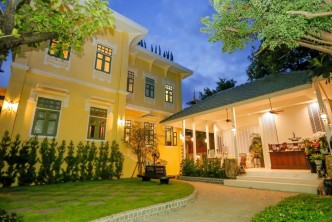Features on Asian Art, Culture, History & Travel
Features
Features > Soi Phat Sai: Caffeine & Opium

Soi Phat Sai: Caffeine & Opium
Story by Joe Cummings / CPA Media (9 February, 2022)
I first strolled down narrow Soi Phat Sai in the heart of Bangkok's Chinatown a few years ago to make my pilgrimage to the legendary Eiah Sae coffeeshop. Operated by the same family since 1927, the vintage establishment roasts and grinds its own robusta blend to brew a strong cup of Hokkien-style coffee, served with condensed milk. Eiah Sae's coffee is heads above the usual cheap and nasty brew Thais call kaa-fae boraan. O-liang, black coffee mixed with sugar and served cold, is also available, as are hot and cold tea, along with an addictive concoction called naw-bi that consists of 45 percent coffee, 45 percent tea, and 10 percent condensed milk.
Fresh bread, baked daily on the premises, is cut into thick slices that are quickly grilled over hot charcoal and then spread with sangkhaya -- a creamy egg custard flavored either with caramelized coconut (the brown version) or pandan leaf (the green). You can also order toast with margarine and sugar, or margarine only. Add a bit of protein with an order of fresh coddled eggs, served in a glass with ground white pepper and Maggi sauce on the side.
In subsequent visits, I learned that Eiah Sae's current owner, Prinya Thongwiriyakun, belongs to the fourth generation of a Chinese family which immigrated from Chao Zhou (also rendered Chiuchow, Chaochow, and Teochew), a town in eastern Guangdong Province. Perhaps in memory of the community history, Eiah Sae means “Fortune Incoming” in Chao Zhou dialect.
Prinya's younger brother runs Ek Teng Phu Kee, another Chaozhou-style coffeeshop with similar vintage ambience and menu, on the same soi. Both of these venerable caffeine outlets are open roughly 5 am to 8 pm daily, and are often filled with elderly Chinese men sitting at round wooden tables, reading Chinese newspapers, and chatting in a mixture of Chao Zhou dialect and Thai.
Outside of the two coffeeshops, Soi Phat Sai is dominated by print shops and small shops selling shoes and cheap clothing. Towards the western end of the soi is a modest shrine dedicated to Kuan Yin, the Chinese Buddhist goddess of compassion.
Also at this end of the soi are three historic Chao Zhou restaurants. The oldest is Yim Yim (spelled “Jim Jim” on the sign's Roman transliteration), founded over a century ago and said to be Thailand's first Chao Zhou eatery. The founding Chao Zhou family, now in its third generation, still owns and operates the restaurant, which is famed for heu sae, a kind of Chinese sashimi in which slices of raw fish -- usually salmon, sea bass, or tuna - arrive on a platter surrounded by a number of herbal seasonings such as white sesame and ginger, along carrots, spring onion, algae, purple cabbage, cucumber, pineapple, and peanuts, plus plum sauce.
Nearby Tang Jai Yoo garnered international foodie attention when Anthony Bourdain declared on his No Reservations series that the restaurant's roast suckling pig was the best he'd ever eaten. Most Bangkokians, however, would argue that the roast pig at New Kwang Meng just around the corner is even better.
At the eastern end of the soi, a local family has renovated their 1916-vintage mansion and transformed it into an elegant four-room boutique hotel called Baan 2459. In back of the hotel, hipster-ish Chata Specialty Coffee serves a hand-crafted Arabica brew at the complete opposite end of the spectrum from the humble robusta found at Eiah Sae and Ek Teng Phu Kee. While a cup of java at the old Chao Zhou coffeeshops costs only 25 baht, a simple Americano at Chata runs 100 baht.
The gentrified hostelry at Soi Phat Sai has its down-market counterpart in the Sin Tai Tong Hotel, which stands next door to Eiah Sae and boasts 24-hour service and rates by the hour.
While such short-time hotels can be found elsewhere in Chinatown, Soi Phat Sai has historical bragging rights when it comes to dens of iniquity. Back when Thailand was the last country to permit legally licensed opium dens, the soi entrance near Wat Samphantawong was home to Heng Lak Hung, the world's largest opium den. Serving also as a boarding house, Heng Lak Hung bore no name sign and had its entrance in the rear of a Chinese restaurant. The inn boasted 5,000 permanent boarders, averaged another thousand transients a day, and at a pinch could accommodate eight thousand.
As journalist Richard Hughes recounted in his memoirs Foreign Devil: Thirty Years Reporting in the Far East, “In that rambling, galleried, muted, poppy-scented labyrinth, permanent boarders enjoyed an average of 10 pipes a night, plus accommodation and a frugal meal, at a cost of about 10 to 15 baht, less than half their normal day's pay. They left in the morning for work, returned in the evening, and then lulled by a couple of hours' unhurried smoking, fell asleep on the plan wooden floors of their cubicles.”
In 1959, Thai authorities declared opium illegal, forced the closing of Heng Lak Hung, and organized a massive bonfire in Sanam Luang to burn the den's estimated 10,000 pipes, said to be the finest collection in the world.
Eiah Sae, 103-105 Soi Phat Sai, tel 09 7242 2870
New Kwang Meng Restaurant, 4-8 Soi Phat Sai, tel 0 2224 2201
Yim Yim Restaurant, 89 Soi Yaowaphanit, off Soi Phat Sai, tel 0 2224 2203
Tang Jai Yoo Restaurant, 85-87 Soi Yaowaphanit, off Soi Phat Sai, tel 0 2224 2167
Baan 2459, 98 Soi Phat Sai, tel 08 2393 2459
Story by Joe Cummings / CPAMedia; Photo by Joe Cummings
